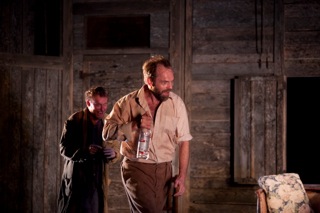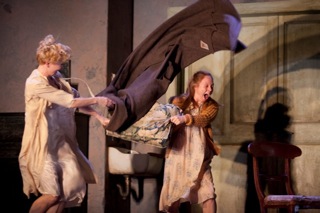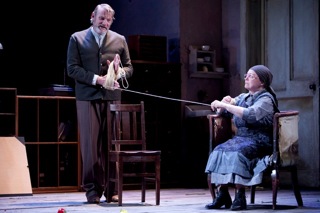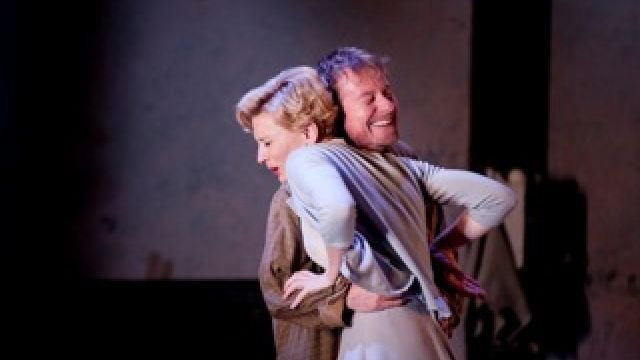Uncle Vanya
Characters trapped in their terminally dull lives skull vodka shots with abandon in theatre that is anything but dull, as a cast of Australia’s finest actors rampage deliciously through Chekhov’s Uncle Vanya.
Uncle Vanya is my favourite play, stretching, as it does, seamlessly across the boundary between drama and comedy, and the fine membrane between surface wit and depressive pain.
The writer and his premiere director Stanislavski famously disputed whether Chekhov’s plays were comedies or tragedies; truth be told, the abundant comedy elevates the stakes of the inherent mundane human tragedy which the plays probe.

In the half dozen productions I’ve seen of Uncle Vanya, and the many more of his other plays, none, I think, has better nailed the searing humanity of Chekhov, while delighting in equal measure with comedy that stretches to vodka fueled slapstick.
Hungarian director Tamas Ascher has gone for timelessness in his production. Zsolt Khell's imposing, time-worn timber set could well be rural Russia circa 1890, yet small hints; a motor bike, a transistor, a fridge, a ceramic tea set and the buzz of mozzies, help the production cross time and space to 1960s outback Australia. Atrrov’s environmental concerns, right there in Chekhov’s script, make it 2010 Green. No Russian accents either, and while there’s much relatively neutral English spoken, Sonya and the elderly nanny Marina, who have spent their entire lives on the estate, speak in broad Aussie accents and vernacular. Blanchett’s chic costuming as the outsider Yelena screams out bored 1950s Hollywood elegance.
 Andrew Upton has produced a made-to-measure adaptation – simple, credible, direct and often colloquial.
Andrew Upton has produced a made-to-measure adaptation – simple, credible, direct and often colloquial.
Has a stronger local cast ever been assembled?
Richard Roxburgh’s passionate, self-obsessed Vanya is dishevelled and demonstratively charismatic. Hugo Weaving’s Astrov has an attractive weather-beaten, boozed out remnant of urbanity about him. Cate Blanchett’s Yelena is a tightly detailed portrait of tightly wound restraint. The intensity of the forbidden passion between Blanchett’s Yelena and Weaving’s Astrov is palpable. John Bell’s Professor is a magnificently malignant, pompous tyrant.
Hayley McElhinney’s Sonya, resigned and practical, grounds the production with a sincere, heartfelt characterization.
 Jackie Weaver, Sandy Gore and Anthony Phelan in supporting roles, and Andrew Tighe as a walk-on, walk-off functionary, sum up the depth of excellence in the casting of this production.
Jackie Weaver, Sandy Gore and Anthony Phelan in supporting roles, and Andrew Tighe as a walk-on, walk-off functionary, sum up the depth of excellence in the casting of this production.
Depression, resentment, emptiness and discontent run rampant in this world of pointlessness, boredom and futility. A forcefield of subtext seems to encompass the world of the play, barely kept at bay, and occasionally fighting its way to the surface to both comic and tragic effect.
Chekhov’s plays can fall victim of too-reverent productions that turn them into dire and dreary dramas, rarifying and sterilizing them into ‘classics.’
No such problems in this lively, and ultimately poignant, all-star production.
Neil Litchfield
Photographs (From Top): Cate Blanchett and Richard Roxburgh; Richard Roxburgh and Hugo Weaving; Cate Blanchett and Hayley McElhinney; Anthony Phelan and Jacki Weaver - Sydney Theatre Company’s Uncle Vanya. Photographer: Lisa Tomasetti.
Subscribe to our E-Newsletter, buy our latest print edition or find a Performing Arts book at Book Nook.

